How to Enable or Disable Clipboard History in Windows 10 With Group Policy
Recent builds of Windows 10 come with a new Clipboard History feature. It implements a cloud-powered clipboard, which allows syncing your clipboard contents and its history across devices you use with your Microsoft Account. You can enable or disable the Clipboard History feature in Windows 10 using Group Policy.
Advertisеment
The Cloud Clipboard feature is officially called Clipboard History. It is powered by Microsoft's cloud infrastructure and utilizes the same technologies that made it possible to have your preferences synchronized across your devices, and your files made available everywhere with OneDrive. The company describes it as follows.
Copy paste – it’s something we all do, probably multiple times a day. But what do you do if you need to copy the same few things again and again? How do you copy content across your devices? Today we’re addressing that and taking the clipboard to the next level – simply press WIN+V and you’ll be presented with our brand-new clipboard experience!
Not only can you can paste from the clipboard history, but you can also pin the items you find yourself using all the time. This history is roamed using the same technology which powers Timeline and Sets, which means you can access your clipboard across any PC with this build of Windows or higher.
It is possible to enable or disable the Clipboard History feature in Windows 10 using either Settings or a Registry tweak. Both methods are reviewed in the article
Enable or Disable Clipboard History in Windows 10
If that's not enough, you can additionally enable or disable Clipboard History with Group Policy.
Enabled (default):
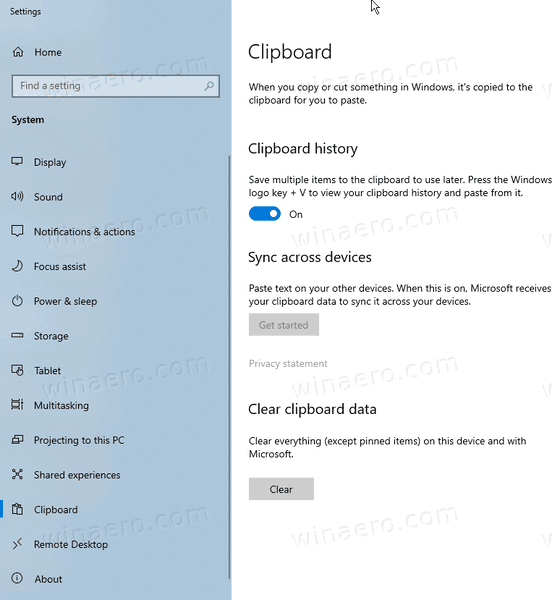
Disabled:
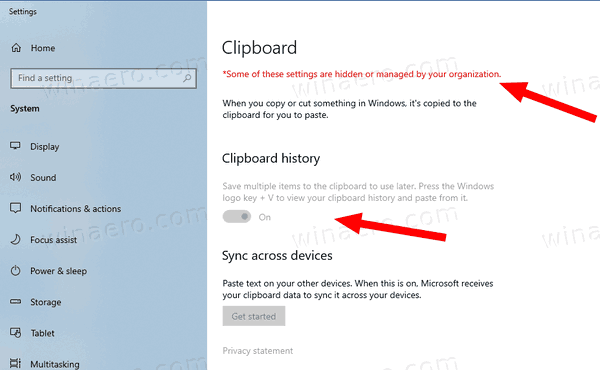
Windows 10 offers you at least two methods, a Local Group Policy Editor option, and a Group Policy Registry tweak. The first method can be used in editions of Windows 10 that come with the Local Group Policy Editor app. If you are running Windows 10 Pro, Enterprise, or Education edition, then the Local Group Policy Editor app is available in the OS out of the box. Windows 10 Home users can apply a Registry tweak. Let's review these methods.
To Enable or Disable Clipboard History in Windows 10 with Group Policy,
- Open the Local Group Policy editor app, or launch it for all users except Administrator, or for a specif user.
- Navigate to Computer Configuration > Administrative Templates > System > OS Policies on the left.
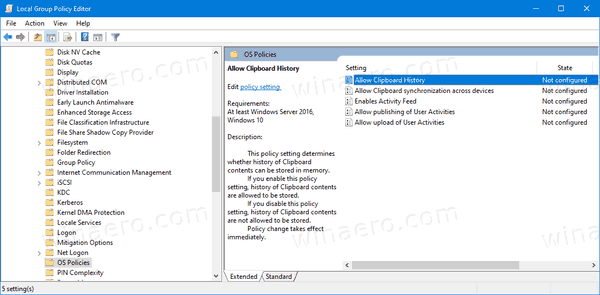
- On the right, find the policy setting Allow Clipboard History.
- Double-click on it and set the policy to Disabled to disable the feature for all users.
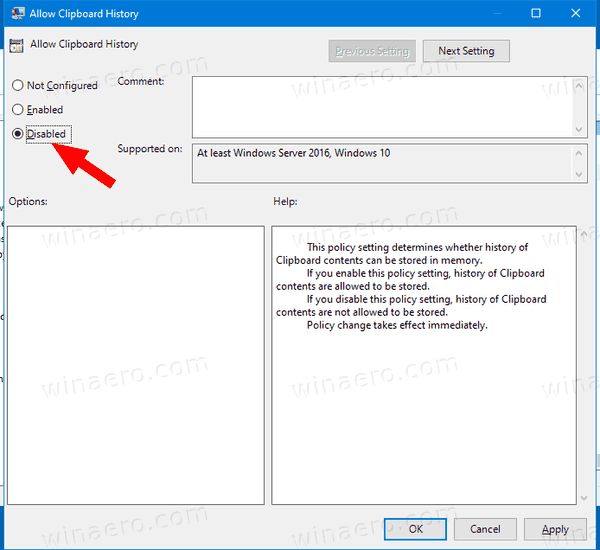
- Setting the option to Enabled or Not configured will allow the user to change the option in Settings (This is default).
You are done. If someone try to access clipboard history options in Settings, he will find it grayed out if it is disabled with Group Policy.
Tip: See How to Reset All Local Group Policy Settings at once in Windows 10.
Now, let's see how the same can be done with a Registry tweak.
Enable or Disable Clipboard History in Windows 10 with Group Policy Registry Tweak
- Open Registry Editor.
- Go to the following Registry key:
HKEY_LOCAL_MACHINE\SOFTWARE\Policies\Microsoft\Windows\System
Tip: See how to jump to the desired Registry key with one click.If you do not have such a key, then just create it. - Here, create a new 32-bit DWORD value AllowClipboardHistory. Note: Even if you are running 64-bit Windows, you still need to use a 32-bit DWORD as the value type.
- Set it to 0 to disable the Clipboard History feature.
- Set it to 1 or delete the value to unblock the feature for users.
- To make the changes done by the Registry tweak take effect, you need to restart the OS.
The ready-to-use Registry files are available here:
The undo tweak is included.
Tip: You can try to enable GpEdit.msc in Windows 10 Home.
Related posts:
Related articles:
- Add Clipboard History Context Menu in Windows 10
- Pin or Unpin Items in Clipboard History in Windows 10
- Clear Clipboard History in Windows 10
Articles of interest:
- How To See Applied Group Policies in Windows 10
- All Ways To Open Local Group Policy Editor in Windows 10
- Apply Group Policy to All Users Except Administrator in Windows 10
- Apply Group Policy to a Specific User in Windows 10
- Reset All Local Group Policy Settings at once in Windows 10
- Enable Gpedit.msc (Group Policy) in Windows 10 Home
Support us
Winaero greatly relies on your support. You can help the site keep bringing you interesting and useful content and software by using these options:
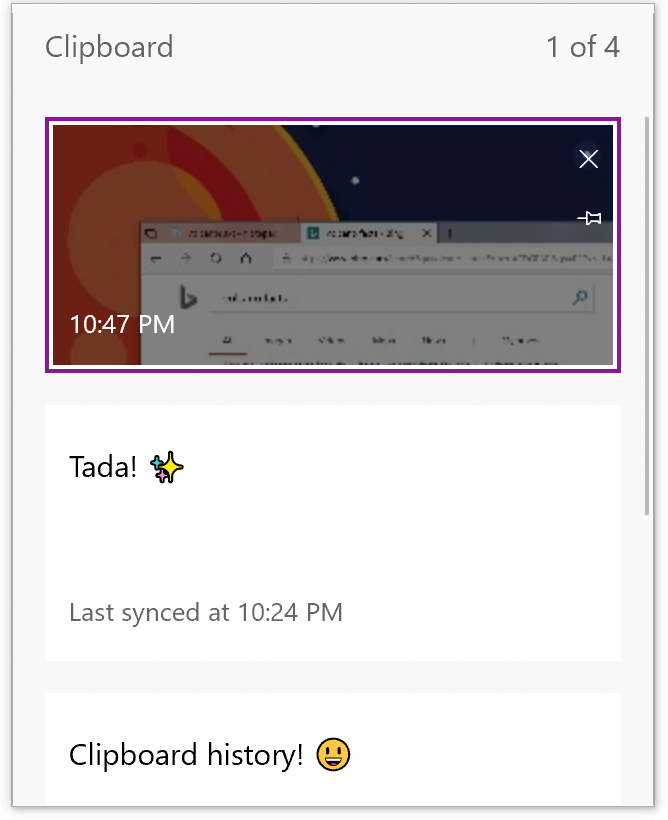

I don’t blame anyone for turning this off. It was build with the expected all thumbs ham fisted programming that has made Microsoft famous
If you need to get an AWESOME clip manager try arsclip. If you need to rename files grab rename master while you are at it. Both are hands down the best and FREE
http://www.joejoesoft.com/cms/showpage.php
1) Donations are nice if you can and
2) The betas are stable. I have only had a couple of instances over YEARS where a beta was broken and he fixed it within a day
Did I mention that his stuff is portable?
I am using arsclip in Windows. It is amazing and great, I really love it.
Btw, Linux users can go with ‘clipit’ (any DE), and xfce4-clipman (also any DE, but initially created for Xfce).